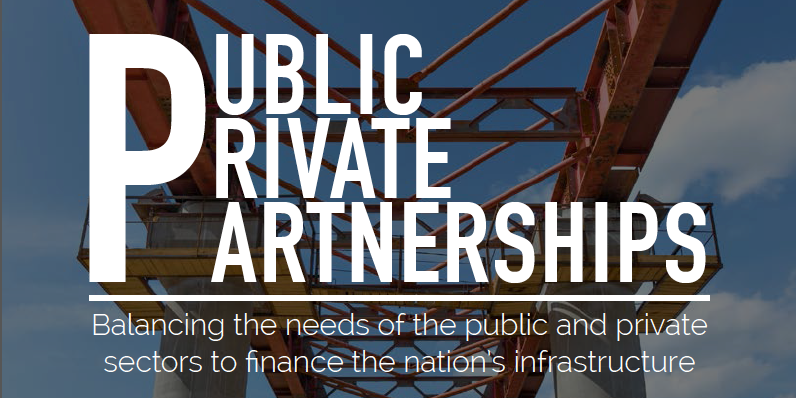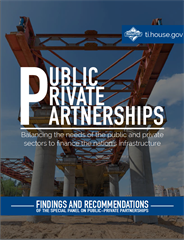Press Releases
Special T&I Panel Releases Report on Public-Private Partnerships The Transportation and Infrastructure Committee’s Panel on Public-Private Partnerships (P3 Panel) today released its final report and recommendations on how to balance the needs of the public and private sector when undertaking P3s to finance the Nation’s infrastructure. The Panel was tasked by Full Committee Chairman Bill Shuster (R-PA) and Ranking Member Nick J. Rahall, II (D-WV) with examining the current use of P3s across the Committee’s jurisdiction – including all modes of transportation, public buildings, water, and maritime infrastructure. The Committee’s Vice Chairman, U.S. Rep. John J. Duncan, Jr. (R-TN), led the P3 Panel, and U.S. Rep. Michael Capuano (D-MA) served as its Ranking Member. The Transportation and Infrastructure Committee’s Panel on Public-Private Partnerships (P3 Panel) today released its final report and recommendations on how to balance the needs of the public and private sector when undertaking P3s to finance the Nation’s infrastructure. The Panel was tasked by Full Committee Chairman Bill Shuster (R-PA) and Ranking Member Nick J. Rahall, II (D-WV) with examining the current use of P3s across the Committee’s jurisdiction – including all modes of transportation, public buildings, water, and maritime infrastructure. The Committee’s Vice Chairman, U.S. Rep. John J. Duncan, Jr. (R-TN), led the P3 Panel, and U.S. Rep. Michael Capuano (D-MA) served as its Ranking Member. “We know the private sector has significant interest in investing in U.S. infrastructure, but the challenge has been how to make sure our federal policies allow this potential to be responsibly unlocked while also protecting the public interest,” said Shuster. “Chairman Duncan and the P3 Panel have provided the Committee with some worthwhile recommendations as we continue to develop legislation to help strengthen our Nation’s infrastructure and our economy.” “While P3s remain an important, limited option for certain projects, this report makes clear that they are no silver bullet when it comes to our infrastructure funding challenges, and that continued federal investment in our highway and transit systems is needed,” said Rahall. “I am grateful for the Panel members’ months of bipartisan work on this report, and I know it will be of great use to the Committee moving forward.” “Billions of dollars of infrastructure needs in the U.S. are in search of funding, and well-executed public-private partnerships can enhance the delivery and management of infrastructure,” Duncan said. “P3s cannot provide the sole solution to all of the Nation’s infrastructure needs, but they can offer significant benefits, particularly for high-cost, technically complex projects that otherwise may risk dying on the vine.” “Throughout this process, my focus has been on how to best invest limited federal transportation funds, and what role public-private partnerships can play in stretching those dollars,” Capuano said. “The Panel studied numerous P3s throughout the country and found a mix of successful partnerships as well as ones that did not meet expectations. Although a transparent and functioning P3 can meet certain transportation needs, when it comes to improving our Nation’s infrastructure there is no question that federal investment remains a key factor in project success. I thank Rep. Duncan for his leadership on the Panel and appreciate his commitment to protecting tax dollars.” Chairman Shuster and Ranking Member Rahall announced the formation of the P3 Panel in January. In addition to Chairman Duncan and Ranking Member Capuano, the Panel included U.S. Rep. Candice S. Miller (R-MI), U.S. Rep. Peter DeFazio (D-OR), U.S. Rep. Lou Barletta (R-PA), U.S. Rep. Eleanor Holmes Norton (D-DC), U.S. Rep. Tom Rice (R-SC), U.S. Rep. Rick Larsen (D-WA), U.S. Rep. Mark Meadows (R-NC), U.S. Rep. Sean Patrick Maloney (D-NY), and U.S. Rep. Scott Perry (R-PA). Over the last six months, the Panel held roundtables, hearings, and meetings to identify the role P3s play in the development and delivery of transportation and infrastructure projects, consider whether P3s enhance the delivery and management of infrastructure projects beyond the capabilities of government agencies or the private sector acting independently, and focus on how to balance the needs of the public and private sectors when identifying, developing, and implementing P3 projects. The final report makes recommendations to grow public sector capacity to better structure agreements and ensure the needs of the public sector are adequately protected. It also proposes improvements to traditional procurement processes to ensure better outcomes for all projects. The report includes a series of recommendations for breaking down barriers to P3s, and changes to federal programs to allow for partnerships to be more easily considered by states and localities. The report also recommends steps to ensure transparency and accountability for P3s, which is critical to fostering public support for such complex agreements. The Transportation and Infrastructure Committee will use the Panel’s recommendations as a resource when considering future legislation. Click image below to read the Panel’s full report and recommendations.  # # # |






